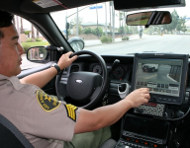Article from: www.thenewspaper.com/news/40/4095.asp
5/8/2013
California: Privacy Groups Sue LAPD Over License Plate Readers
ACLU and Electronic Frontier Foundation sue Los Angeles, California law enforcement for refusing to disclose spy camera details.
 Privacy groups are upset that law enforcement has been using cameras to track the movements of motorists who are not suspected of any wrongdoing. To investigate how this information is used, the American Civil Liberties Union (ACLU) last year formally sought information on automated license plate recognition cameras (ALPR, also known as ANPR in Europe) from law enforcement agencies around the country. The Los Angeles, California Police Department (LAPD) refused to hand over some related documents, so the ACLU joined on Friday with the Electronic Frontier Foundation (EFF) in filing a lawsuit to compel disclosure.
Privacy groups are upset that law enforcement has been using cameras to track the movements of motorists who are not suspected of any wrongdoing. To investigate how this information is used, the American Civil Liberties Union (ACLU) last year formally sought information on automated license plate recognition cameras (ALPR, also known as ANPR in Europe) from law enforcement agencies around the country. The Los Angeles, California Police Department (LAPD) refused to hand over some related documents, so the ACLU joined on Friday with the Electronic Frontier Foundation (EFF) in filing a lawsuit to compel disclosure.
Police agencies and politicians claim the high-speed tracking cameras are only used to find stolen cars, but the machines in Los Angeles have already collected 160 million pieces of information on the public, including individuals not suspected of having committed any crime. The ACLU and EFF sought last August to obtain a sample week's worth of the actual data LAPD collected so that the public could judge for itself.
"Location-based information like license plate data can be very revealing," EFF attorney Jennifer Lynch said in a statement. "By matching your car to a particular time, date and location, and then building a database of that information over time, law enforcement can learn where you work and live, what doctor you go to, which religious services you attend, and who your friends are. The public needs access to the data the police actually collected to be able to make informed decisions about how ALPR systems can and can't be used."
In September, LAPD refused to hand over the sample data, claiming it "contains official information" and was part of an investigative file exempt from the public records law. The Los Angeles Sheriff's Department was even less responsive, refusing to disclose the number of vehicles on the "hot list" and the generic reason why individuals would ever be added to it. The sheriff's office even lost track of the information it was denying on "investigative" grounds by sending information to EFF that it refused to provide to ACLU. The groups point out that the right to obtain government documents is enshrined in California's constitution.
"The people have the right of access to information concerning the conduct of the people's business, and, therefore, ...the writings of public officials and agencies shall be open to public scrutiny," Article 1 Section 3 states.
Neither the LAPD nor the sheriff's department has filed a formal response. A Los Angeles County Superior Court judge will decide whether these agencies should be forced to hand over the information.
 Privacy groups are upset that law enforcement has been using cameras to track the movements of motorists who are not suspected of any wrongdoing. To investigate how this information is used, the American Civil Liberties Union (ACLU) last year formally sought information on automated license plate recognition cameras (ALPR, also known as ANPR in Europe) from law enforcement agencies around the country. The Los Angeles, California Police Department (LAPD) refused to hand over some related documents, so the ACLU joined on Friday with the Electronic Frontier Foundation (EFF) in filing a lawsuit to compel disclosure.
Privacy groups are upset that law enforcement has been using cameras to track the movements of motorists who are not suspected of any wrongdoing. To investigate how this information is used, the American Civil Liberties Union (ACLU) last year formally sought information on automated license plate recognition cameras (ALPR, also known as ANPR in Europe) from law enforcement agencies around the country. The Los Angeles, California Police Department (LAPD) refused to hand over some related documents, so the ACLU joined on Friday with the Electronic Frontier Foundation (EFF) in filing a lawsuit to compel disclosure.